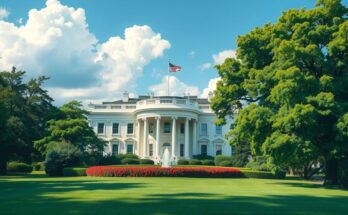Gabon has adopted a new electoral code, facilitating a return to civilian rule post-coup. The transitional government is committed to democratic elections, with provisions for military candidates and dual nationals. This legislation paves the way for transparency and accountability in the electoral process, reflecting a significant shift from the previous Bongo dynasty-led governance.
Gabon’s transitional national parliament has enacted a new electoral code, marking a crucial milestone in resuming civilian governance after a coup that concluded the long-standing Bongo family rule. Transitional President General Brice Oligui Nguema has committed to reinstating civilian authority with a presidential election scheduled for August, following two years under military control.
A total of 168 lawmakers and senators endorsed the electoral code late Monday, following a review of the 383 articles produced by a national commission in December. The Central African nation, previously governed by the Bongo dynasty for 55 years, established a new constitution through a referendum in November, limiting the presidency to two seven-year terms and prohibiting dynastic succession.
The new electoral code permits military personnel and magistrates to run for positions under specific conditions, a provision critics argue could enable General Oligui to vie for the presidency. General Oligui, who rapidly assumed leadership of the oil-rich nation after the coup, has openly expressed his aspirations for the presidency.
Additionally, the revised code allocates two parliamentary seats for Gabonese citizens living abroad and permits individuals with dual nationality to participate in elections—excluding the presidential post—without renouncing their other citizenship. Jean-Francois Ndongou, president of the transitional national assembly, lauded the progression towards a more transparent and fair electoral process.
“The ultimate objective is to be able to organise perfect elections, unquestionable, free, transparent and democratic,” stated Ndongou, as recorded in a document reviewed by AFP. So far, the established timetable for the transition has been adhered to, with the interim parliament confirming the constitutional text in September and subsequent referendum solidifying its adoption.
Gabon has experienced a significant political shift following the coup that removed long-time President Ali Bongo Ondimba from power. The new transitional government aims to pave the way for democratic elections, responding to demands for accountability and reform. The newly adopted electoral code is part of efforts to ensure free and fair elections in an environment previously marred by dynastic rule, aiming for a departure from past electoral malpractice and establishing a foundation for legitimate leadership.
In summary, the adoption of Gabon’s new electoral code represents a vital step towards restoring civilian governance and establishing a framework for fair electoral practices. The transitional government’s move to allow military and magistrate candidacy, alongside provisions for dual nationals, reflects an effort to modernize the electoral landscape. As Gabon approaches its scheduled elections, the commitment to transparency and democratic principles remains essential for the nation’s political evolution.
Original Source: www.barrons.com




